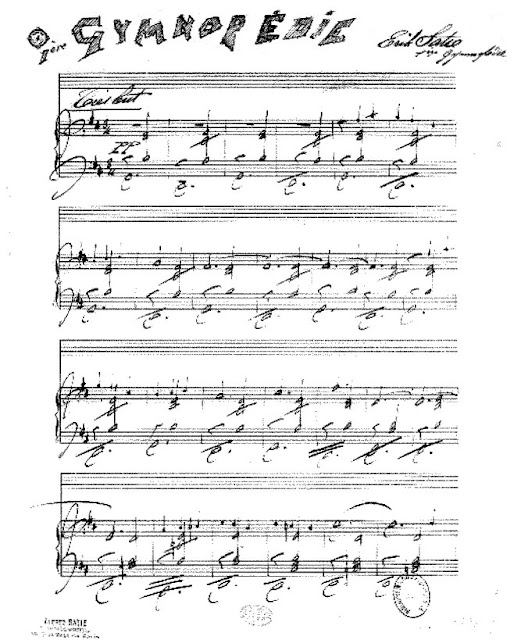Erik Satie dedicated his first Gymnopedie, his most famous and beloved work, to Jeanne de Bret in the 1895 publication edition of the sheet music.
The second Gymnopedie was dedicated to Satie's brother Conrad and the third was dedicated to the composer Charles Levadé. One personally significant to Satie, the other professionally significant. So what is the significance of Mademoiselle Jeanne de Bret?
In his 1992 article, Satie and the Art of Dedication, Satie scholar Robert Orledge wrote:
Jane Bathori incidentally, first heard of Satie and his music through Satie's classmate Jeanne de Bret, the dedicatee of the first Gymnopedie (in its private printing), and Jeanne's sister, Valentine, was the dedicatee of the early Contamine de Latour setting "Chanson" in 1888.
That's it for the de Bret sisters though.
I did my own research, trying to find any mention of the de Brets on ancestry sites, and while there were many born Jeanne de Brets throughout French history, none of them matched the age of what I assumed was a contemporary of Satie and there has been no Valentine de Bret, ever.
So in exasperation I emailed Orledge and asked him where he got that information. His response was that it came from Ornella Volta and:
"Sadly she died last year and I never found out where she got her information from. But she was always extremely reliable though."
Ornella Volta is the greatest Satieologist. It's my impression that Orledge is the second greatest.
Jane Bathori was a singer and at one point ran a theater. She was eleven years younger than Satie and died in 1970 at the age of 92. Bathori worked with Satie and knew many of the musicians in his circles. She herself was the dedicatee of many pieces of music.
After I got that unsatisfactory response from Orledge I began to Google "Jane Bathori" and "de Bret" which is what I should have done in the first place after reading Orledge's 1992 article.
It turns out that Bathori had written a memoir, published in 1964 by Journal of the British Institute of Recorded Sound called "Musicians I have known." This piece is quoted in a book I found in Google Books, Satie Remembered written by... Robert Orledge!
In 1964, Bathori wrote:
What a strange figure Satie was! I did not know him until I met him at a talk about him given by Roland-Manuel in a Paris salon in 1916. I had often heard him spoken of about 1890 by a class-mate to whom he had dedicated some of his earliest works, but she had not understood whom she had to deal with and had not given him the attention that he perhaps deserved; and I was too young to be really curious - otherwise I might have appreciated both the naïveté and elegance of his early songs...
So the mystery deepens!
First, while it's probable that Ornella told Orledge about the Journal of British Institute piece, it's clear that Orledge got the info about Jeanne de Bret from the Bathori memoir. And the way it's written, it sounds like Jeanne de Bret was a classmate of Bathori, not Satie. Another odd thing, Bathori heard about Satie from de Bret in 1890, which was five years before the 1895 edition of the first Gymnopedie was published with the dedication to de Bret. Also, the only work known to be dedicated by Satie to de Bret was the Gymnopedie, contrary to Bathori's "some of his earliest works" plural.
Weirdest of all, was this part:
(de Bret) had not understood whom she had to deal with and had not given (Satie) the attention that he perhaps deserved;
Which makes it sound like de Bret was a young woman Satie had a crush on, but who was completely uninterested in Satie. But it's hard to know how accurate Bathori's memory was, she was 86 in 1964.
And if de Bret was a classmate's of Bathori, she would have been around 12 years old, in 1890 and Satie around 23, and if that's the case I hope Satie did not have a crush on her. If she was 12 when she knew Satie, that would explain why she didn't appreciate Satie any more than Bathori did.
There's probably more to the story than that, but if Volta didn't discover it, I doubt it will ever be discovered.
While I don't doubt that Volta was reliable, my research into the lives of Satie and Valadon, for my play LE CHAT NOIR, has given me a bad impression of biographers in general. Many times I've caught them making claims that I know are incorrect. For example, in a published biography of Valadon, the author claimed that Satie wrote "Bonjour Biqui Bonjour" for Valadon for her birthday. But their relationship lasted from January to June, 1893, and we know that for sure because Satie says it himself. Valadon's birthday is September 23.
And then there are the idiots who believe Satie only ate white foods.
I will have more to say about that soon.
Satie's hand-written score for le premiere Gymnopedie. Sans dedication to Mlle. le Bret.



